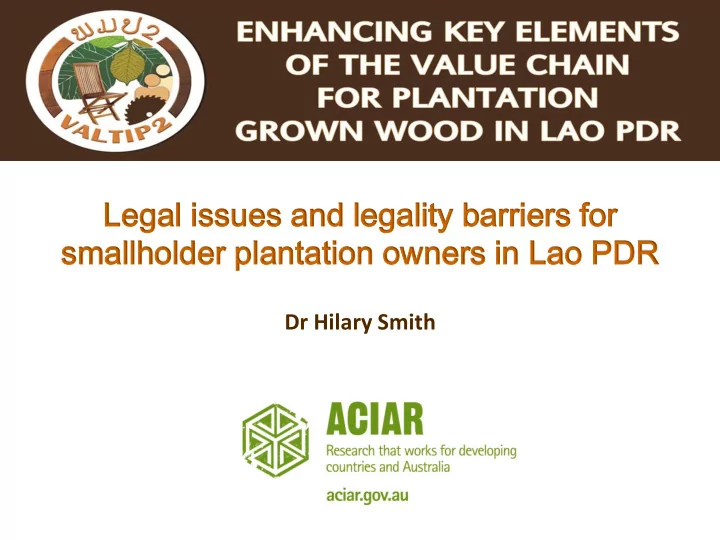

Le Lega gal is l issu sues es an and l d leg egal alit ity y ba barriers iers fo for sma mallh llhold older er pl plan anta tatio tion n ow owne ners rs in in La Lao P o PDR DR Dr Hilary Smith
Co Contex ntext • Lao PDR’s timber industry is dependent on native forests, industrial plantations and conversion timber. • There is pressure to reduce illegal logging - The Government is responding • Increasing plantation grown timber is one element - 500,000 ha by 2020. • Smallholder plantations are seen as an important (but small) part of this • Most timber is (eventually) exported to neighbouring countries • Certification and Legality Verification are required by some importing countries • Resulting in Law reform
Proj roject ect Ob Objectives ectives Improve livelihoods for farmers and processing workers, and the international competitiveness of Lao PDR’s wood industries. • Address constraints and inefficiencies in the value chain, from harvest to processor stages, that limit returns to smallholder growers; • Increase returns to processors and smallholders through improved efficiencies of the primary wood processing sector; • Improve the value and quality of wood products for domestic and export markets; and • Enhance the competitiveness and capacity of wood processing industries.
Th The e Val alue ue Ch Chain ain 3.B Certification 3.A Grower Groups 2.B Transaction Costs 1. Mapping Inventory 2.A Legal Barriers and Issues Registration Plantation Processing Local Harvesting Tax receipt Plantation Market and Sales Transport Processing Agent TLUC Plantation Export Land Book Plantation Market Harvesting and Sales Processing Transport Plantation Agent
Le Legal gal Re Research search The Research Question: How can barriers to legal registration of smallholder planted trees be addressed? • Registration of smallholder planted trees is a legal requirement for harvesting and selling wood. • Plantation Registration Certificates (PRCs) are the starting point in the legal chain for tracking the origin of timber. • Only ~10% of teak smallholder plantations are registered.
On One Big g Qu Questi stion on Many Small Questions – Who are smallholder plantation owners? – What is the governance structure and policy environment? – What are the laws? – What is the legal process - how are the laws applied and understood? – What are the divers for legality? – What are the risks of illegality? – What are the incentives/disincentives to comply? – What else is at play: legal pluralism, cultural norms? – Are laws enforced?
Re Research search Meth ethods ods How can barriers to legal registration of smallholder planted trees be addressed? – Collate and review ~ 300 laws, legal instruments and texts – Create legal maps of the ‘value chain’ – Interview smallholders – Discussions with Industry and Government – Report & Policy Brief – Recommendations & Solutions
Legal Le gal Map apping ping Harvesting & Plantation Land Allocation Transport Trading Registration Taxes Wood Processing Export
Go Gower er int nter ervi views ews Smallholders with un-registered Smallholders with registered plantations plantations Why haven’t you registered your Why did you register your plantation? plantation? Better Don’t Wood Free understand price Certificate Scattered the process planting Land Tax exempt No Legal Land benefit Use Right
Findings…. 90% of plantations are NOT registered – The process is complex, costly and long – The tax incentives are not enough – There is no imperative or requirement to register early – Many remain un-registered until just before harvesting (then PRCs are borrowed) – Many do not know they need to register – It does not provide secure tenure – It does not increase their income – They can sell their wood without it
….Findings This causes problems for Industry & growers – Timber from smallholder plantations is high quality, industry wants to buy it – To export, ‘legality’ must demonstrated – PRCs are needed to demonstrate ‘legality’ – Industry say they will pay more for PRC wood – But there is not enough PRC wood available – They do not buy what is available – Growers do not see the benefit of PRCs – The timber is sold into non-legal supply chains – Local industry misses out!
Next steps… Revisit the question: “What are the barriers to legal registration of smallholder plantations?” Consider: “Has plantation registration become a barrier to legal smallholder grown wood?” What are the alternatives?
THANKYOU Partners Faculty of Forestry, National University of Laos, The University of Melbourne, Australia, The Australian National University, Australia, Luang Prabang Teak Program (LPTP), Souphanouvong University, Pakpasack Technical College, Lao Furniture Industry Association, Lao Department of Industry , Ministry of Industry and Commerce, The Forests Trust/ Lao Forests & Trade Platform, Northern Agriculture and Forestry Research Centre, Lao National Wood Industry Association, Lao Department of Forestry, Lao Department of Forest Inspection
Recommend
More recommend